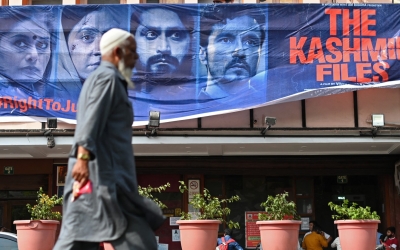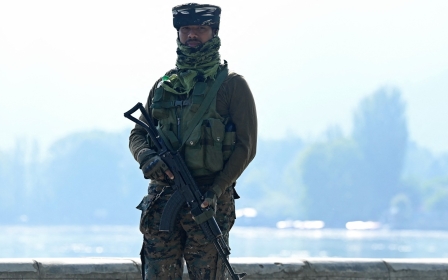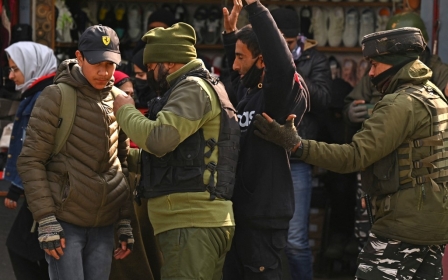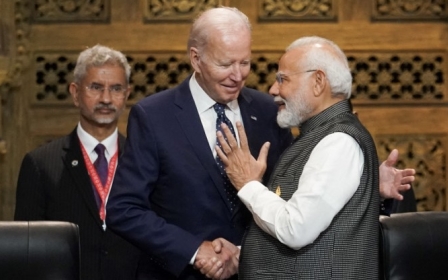Article 370: Four years after India repealed it, Kashmiris still live in terror
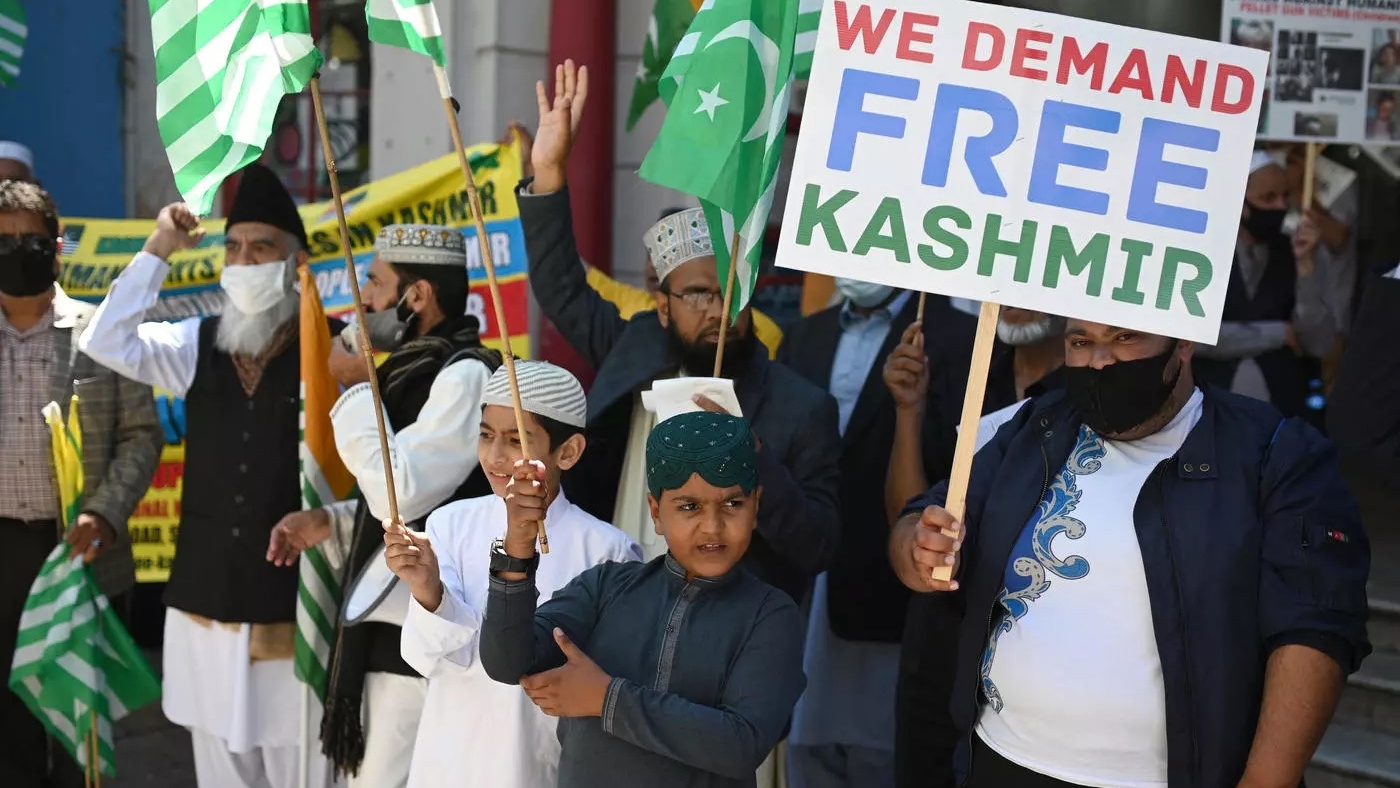
In Zadoora, a leafy hamlet in southern Kashmir, native Muslim men almost mechanically rambled towards a local mosque along the dew-dashed pathways when dawn was yet dark, and all you could hear were the early melodies of a thrush.
Soldiers of the 50 Rashtriya Rifles (RR) - a counter-insurgency force of the Indian military - intercepted the muezzin amid his prayer calling and forced him to chant the Hindu slogan "Jai Shree Ram", which translates to "victory to Lord Ram".
The terror in the muezzin's voice could be heard as he chanted those words, his speech fading like the chuff of a distant train. Many other worshippers in the village acquiesced and partook in the chanting. According to Indian media, the soldiers had reportedly held up 10 villagers, beating up five of them.
The incident in June prompted a rebuke from former Jammu and Kashmir chief minister, the stern-faced Mehbooba Mufti, whose tweet was not without merit and very strongly worded: "Shocked to hear about army troops from 50 RR storming into a mosque at Pulwama and forcing Muslims inside to chant 'Jai Shree Ram'. Such a move when [Home Minister] Amit Shah is here and that too ahead of yatra [a Hindu pilgrimage] is simply an act of provocation."
The incident was the first of its kind in many months, as the army has continued to downplay its hand in gross human rights violations across the Kashmir valley.
A 'vast mine of grief'
Kashmir, to the outside world, has always stirred the poet's muse. It is a land complete with nature's most evocative sceneries: its undulating woodlands full of variegated tree life; its air clean - free from the defects of India's industrial resurgence; and its valleys canopied by snow-encrusted cliffs, ceilings from where rills full of cold limpid waters wind down as though they are fulfilling a sort of terrestrial prophecy.
Yet, despite these natural embellishments, the valley continues to be a vast mine of grief, of old political dissent, and of remarkable nervous energy.
Across India, the revocation of Kashmir's special status was reverentially dubbed 'Modi's master stroke' and received wide approval
The majority of the Kashmiri Muslim population has for generations experienced a tormented life, cowering in terror by one of the worst occupational crimes in human history.
India's occupation of Kashmir has also resulted in one of the most rebellious uprisings in the region. These insurgencies had troubled lawmakers in New Delhi for more than three decades. The real turning point was the Kashmir elections of 1987 - popularly thought to be a sham - which disillusioned a large majority of the Kashmiri youth, who thereafter decided to boycott all subsequent polls on grounds that they can never substitute their right to self-determination.
But with the rise of Narendra Modi's radical India, things took a sharp and ugly turn when on 6 August 2019, his government abrogated Article 370 of the Indian constitution, which granted autonomy to the state of Kashmir, India's only Muslim-majority state. The provision was put in place to fortify Kashmir's religious identity and even discouraged India's Hindu majority from settling there.
The reaction of ordinary Kashmiris was one of shock and total bewilderment, and very soon, large throngs of them descended on the streets in protest against the move, which across India was reverentially dubbed "Modi's master stroke" and received wide approval. Modi was quick to reinforce his decision by sending in large bands of Indian troops in an early effort to stifle any form of dissent.
Srinagar, Kashmir's capital, looked still, not out of peace but out of fear; the thoroughfares that commonly hummed with market activity were shuttered; coils upon coils of barbed wire littered the intersections; soldiers patrolled every street, every nook and bend of the capital; and the military presence swelled across the state, in what seemed to be one of the densest military deployments and curfew sieges in recent history.
At Khanqah-e-Moula, Srinagar's landmark 200-year-old mosque, Friday prayers were banned. All mobile phones went dead, and all internet connections were severed.
Systemic repression
Reports that came out in the following months and even years were largely traumatic. Soldiers were often seen breaking into homes in the middle of the night, rooting through furniture, abusing men and women, and damaging food supplies.
Indian security forces dealt with angry protesters using pellet-firing shotguns. "Even the US didn't do this during its war against Iraq," wrote a disturbed and disgruntled Arundhati Roy, the Man Booker Prize-winning author from Delhi, and one of the very few debunking and formidable voices on what she believes is a sort of cultural erasure of maniacal proportions.
A perceptible assault on freedom of expression within Jammu and Kashmir continues. Raids on offices and homes of investigative journalists have become commonplace
Adding to that is the manner in which the Supreme Court of India handled the subject with cold indifference, almost turning a blind eye to those hundreds of habeas corpus petitions from common Kashmiri civilians seeking justice.
Moreover, the new "Domicile Law" permits all Indian citizens to purchase homes, cast votes, and apply for jobs in Kashmir.
Many look upon the move as a malicious attempt to systematically isolate Kashmiri Muslims, pushing them further into the wilderness and intense uncertainty, and leaving them virtually stateless and guillotined.
A perceptible assault on freedom of expression within Jammu and Kashmir continues. Raids on offices and homes of investigative journalists have become commonplace. A senior editor of a prominent daily newspaper told Amnesty International: "It has become impossible for journalists to continue their work independently."
This crackdown isn't reserved for serious journalists; even those pursuing uncontroversial positions have been targeted. In the autumn of last year, Sana Irshad Matoo, a Srinagar-based photojournalist, chosen to attend the 2022 Pulitzer Prize ceremony in New York for her coverage of the Covid-19 pandemic in India, was barred from leaving Indian shores, even as she held a valid US visa and plane ticket. Matoo later tweeted of her disappointment.
Even Bollywood, India's money-spinning movie industry, seems to be openly falling in line with Modi's anti-Muslim propaganda. The Kashmir Files, a movie that was released in theatres last year to great fanfare, was basically a mawkish ode that further deepened the ethnic divide, portraying Muslims as evil butchers whose primal instinct is only to kill and slaughter.
And all that when the valley is literally a ghastly labyrinth of Muslim graveyards. Modi has certainly ruptured the longstanding Indian ideals of tolerance, poisoned its culture, and stabbed its secular foundations into an abyss from which India may never recover.
And when he recently greeted US President Joe Biden at the White House, he looked nothing short of a prized guest.
The outcome of the meeting was hardly a matter of surprise: when leaders of two frontline economic giants come together, they have better things to talk about than human rights transgressions.
The views expressed in this article belong to the author and do not necessarily reflect the editorial policy of Middle East Eye.
Middle East Eye propose une couverture et une analyse indépendantes et incomparables du Moyen-Orient, de l’Afrique du Nord et d’autres régions du monde. Pour en savoir plus sur la reprise de ce contenu et les frais qui s’appliquent, veuillez remplir ce formulaire [en anglais]. Pour en savoir plus sur MEE, cliquez ici [en anglais].



